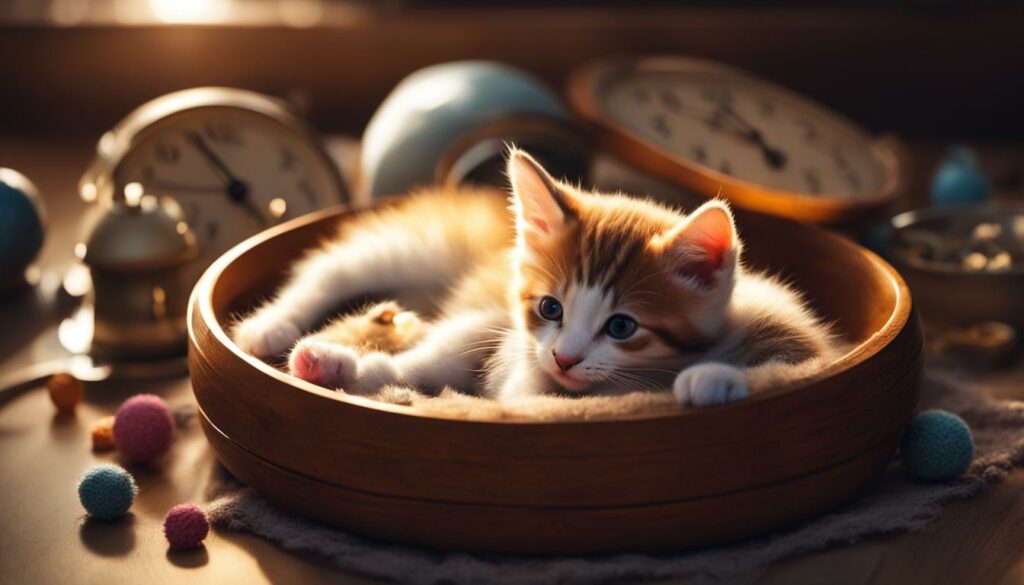Leaving kittens alone for extended periods can have detrimental effects on their well-being. Loneliness and anxiety can lead to health and behavioral issues. The maximum duration a kitten can be left alone depends on their age, ranging from under 4 hours for kittens under 4 months to 24 to 48 hours for adult cats. However, leaving cats alone for more than a day is not recommended due to potential problems such as food and water shortages, soiling the house, boredom, and possible injuries. It is crucial to ensure that someone checks on your kitten or hire a pet sitter if you need to be away for more than 24 hours.
Key Takeaways:
- Leaving kittens alone for long periods can lead to loneliness and anxiety, causing health and behavioral issues.
- The maximum time a kitten can be left alone depends on their age, ranging from less than 4 hours for kittens under 4 months to 24 to 48 hours for adult cats.
- Leaving cats alone for more than a day is not recommended as it can lead to various problems such as food and water shortages, soiling the house, boredom, and potential injuries.
- If you need to be away for more than 24 hours, it’s important to have someone check on your kitten or hire a pet sitter.
Leaving a Kitten Alone – Is It a Good Idea?
Leaving a kitten alone for extended periods of time can have both physical and emotional consequences. While adult cats can handle being left alone for longer durations, kittens require more attention and care. It’s important to consider their age when deciding how long to leave them unsupervised.
Tips for Leaving Kittens Alone:
- Ensure a safe environment: Remove any potential hazards or items that could harm the kitten, such as sharp objects or toxic plants.
- Provide food and water: Make sure the kitten has access to fresh food and water while you’re away. Consider using automated feeders or water dispensers to regulate their intake.
- Playtime and stimulation: Leave interactive toys or puzzles to keep the kitten mentally stimulated and entertained. This can help prevent boredom and destructive behavior.
- Consider a pet sitter: If you need to be away for more than 24 hours, it’s advisable to have someone check on your kitten or hire a professional pet sitter.
By following these tips, you can ensure that your kitten is safe and comfortable while you’re away.
“Leaving a kitten alone for extended periods can have negative consequences, including running out of food, dirty water, soiling the house, boredom, and potential injuries.”
H3: The Importance of Socialization
Socialization plays a key role in a kitten’s development. Early positive experiences with humans and other animals can help them become well-adjusted and confident cats. Leaving a kitten alone for too long without proper socialization can lead to fear, anxiety, and behavioral issues. It’s important to gradually expose kittens to new experiences and provide opportunities for interaction with people and other pets.
| Age | Maximum Recommended Alone Time |
|---|---|
| Under 4 months | Less than 4 hours |
| 4 to 6 months | 4 to 8 hours |
| 6 months to 1 year | 8 to 16 hours |
| Adult cats | 24 to 48 hours |
As kittens mature and become more independent, their ability to handle being alone for longer periods increases. However, it’s always best to provide them with companionship and stimulation whenever possible.
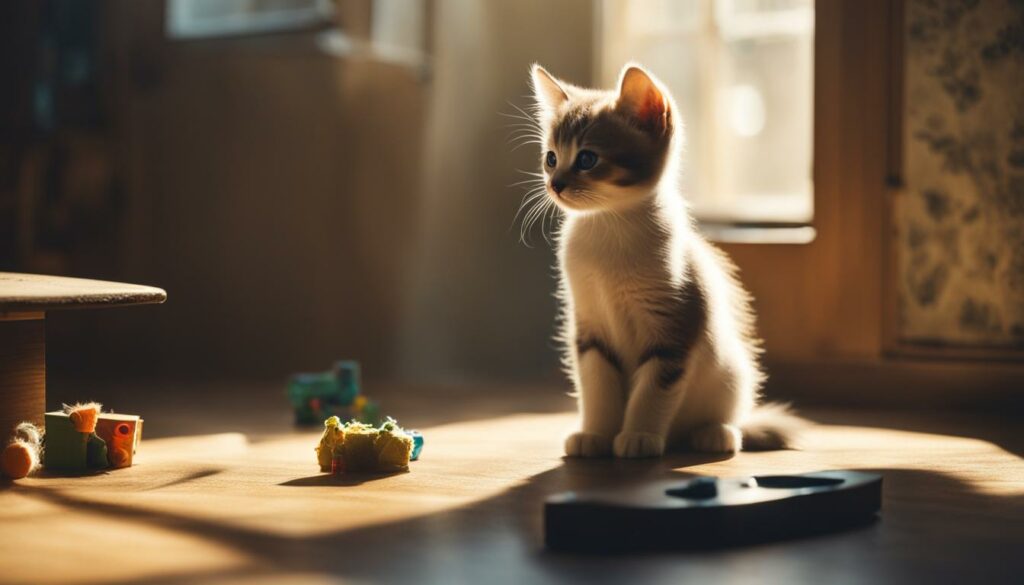
Kitten-Proofing Your Home
When leaving a kitten alone, it’s crucial to create a safe environment for them. Kitten-proofing your home will help prevent accidents and ensure your furry friend’s well-being. Here are some essential steps to take:
- Shut all doors and windows to prevent your kitten from escaping or getting stuck.
- Remove breakable items and sharp objects that could harm your kitten if knocked over or chewed on.
- Hide electric cords to prevent your kitten from chewing on them and potentially experiencing electric shocks.
- Remove house plants and insect traps, as they may be toxic to cats if ingested.
- Place the litter tray in one corner of your home and the food and water bowls in another corner to keep them separate.
- Cover small holes or gaps where your kitten might get stuck or trapped.
- Keep harmful food items out of reach, such as grapes, raisins, citrus fruits, chocolates, raw eggs and meat, onions and garlic, caffeinated drinks, yeast, and alcohol.
By taking these precautions, you can ensure your kitten’s safety and provide them with a secure and comfortable environment even when they are left alone.
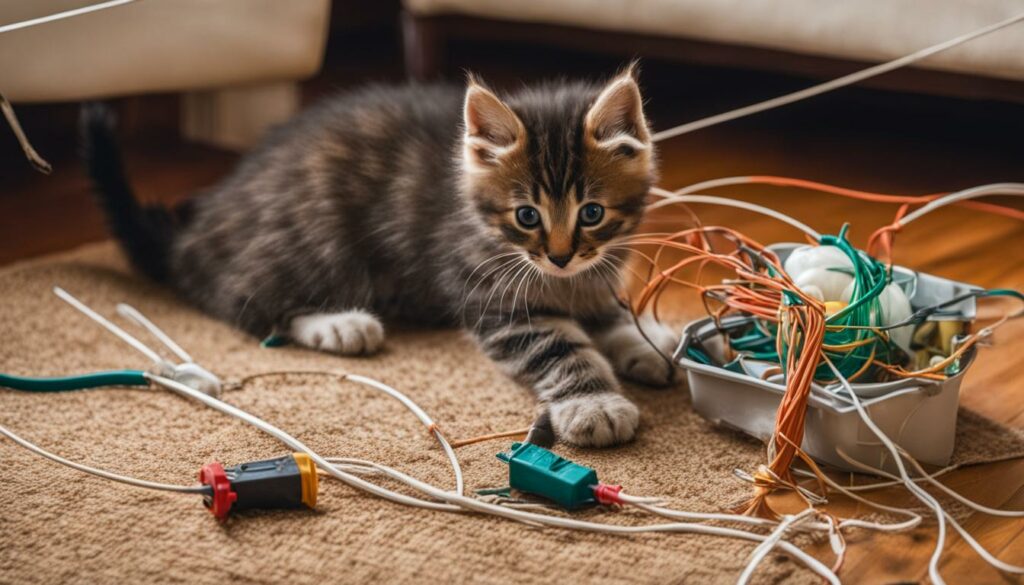
The Importance of Kitten-Proofing
“Kitten-proofing your home is essential to create a safe environment for your furry friend. By removing potential hazards and ensuring their well-being, you can have peace of mind when leaving them alone.”
Kitten-proofing not only protects your kitten from accidents and injuries but also helps prevent destructive behavior. A safe environment reduces the chances of your kitten damaging furniture, chewing on cords, or ingesting toxic substances. It also minimizes the risk of your kitten getting trapped or escaping from your home. By proactively kitten-proofing your home, you can create a space where your kitten can thrive and explore safely, even when you’re not there to supervise.
Keeping Your Kitten Entertained
When leaving your kitten alone, it’s important to provide them with ways to stay entertained and stimulated. Interactive toys can be a great way to keep your kitten occupied and mentally engaged. Toys that encourage your kitten to chase, pounce, and bat can help mimic hunting behavior and provide much-needed exercise. Look for toys with feathers, bells, or dangling strings that will catch your kitten’s attention.
In addition to interactive toys, consider leaving toys around the house for your kitten to discover and play with. This can include small plush toys, balls, or even paper bags that they can explore and hide in. Having a variety of toys will help keep your kitten entertained and prevent them from getting bored.
Another option to consider is a scratching post or a cat tree. Providing your kitten with a designated place to scratch and climb can help prevent them from scratching furniture or curtains. It also gives them a place to perch and observe their surroundings, which can be quite entertaining for them.
| Interactive Toys | Benefits |
|---|---|
| Feather wands | Encourages chasing and pouncing |
| Treat-dispensing toys | Provides mental stimulation and rewards |
| Puzzle toys | Engages problem-solving skills |
Remember to rotate your kitten’s toys regularly to keep them interested. What may seem boring one day can become enticing again after a little break. By providing a range of toys and activities, you can help keep your kitten entertained and prevent boredom and destructive behavior.
Creating a Safe Environment for Play
While it’s important to keep your kitten entertained, it’s equally important to ensure they are playing in a safe environment. Kitten-proofing your home can help prevent accidents and keep your kitten out of harm’s way. Here are a few tips for creating a safe play area:
- Remove any small objects that your kitten could swallow.
- Secure cords and wires so that your kitten can’t chew on them.
- Block off any areas where your kitten could get stuck or injured.
- Use pet-friendly cleaning products to ensure your kitten doesn’t come into contact with harmful chemicals.
By providing a safe and stimulating environment for your kitten, you can help ensure they stay entertained and happy while you’re away.
The Importance of Proper Cat Care
Proper cat care is essential to ensure that our feline friends feel content and well-cared for, even when left alone. It involves providing regular playtime, taking care of their healthcare needs, grooming them regularly, and feeding them a balanced diet.
Playtime for Cats
Cats are active and curious creatures, and playtime is crucial for their mental and physical stimulation. Set aside dedicated play sessions each day to engage with your cat using interactive toys, such as feather wands, balls, or puzzle toys. Not only does playtime provide exercise and prevent boredom, but it also strengthens the bond between you and your cat.
Healthcare for Cats
Regular healthcare is vital to ensure your cat’s overall well-being. This includes vaccinations to protect against common diseases, annual vet check-ups to monitor their health, and preventive treatments for fleas, ticks, and worms. Additionally, it’s essential to be observant of any changes in your cat’s behavior or appetite and seek veterinary attention if needed.
Grooming for Cats
Grooming is an important aspect of cat care, as it helps to maintain their cleanliness and overall health. Brushing your cat’s fur regularly not only helps to prevent matting and hairballs but also strengthens the bond between you and your furry companion. Additionally, keep an eye on your cat’s ears, nails, and teeth, and seek professional grooming assistance when necessary.
Balanced Diet for Cats
Feeding your cat a balanced and nutritious diet is essential for their growth, energy levels, and overall health. Cats are obligate carnivores, meaning they require a diet that is rich in animal protein. Choose high-quality cat food that provides all the necessary nutrients, including amino acids, vitamins, and minerals. Avoid feeding your cat from the table, as certain human foods can be toxic to cats. Remember to provide fresh water at all times to keep your cat hydrated.
By prioritizing proper cat care, we can ensure that our feline companions lead happy and healthy lives, even when we need to leave them alone for a period of time.
The Nutritional Needs of Kittens
Proper nutrition is crucial for the healthy growth and development of kittens. As obligate carnivores, kittens require a high-protein diet to meet their unique nutritional needs. Animal proteins, such as lean meat and fish, are essential for kittens as they provide vital amino acids like taurine and arginine, which are not found in plant-based foods. It is important to provide a diet with at least 50% animal protein, less than 20% animal fat, and no carbohydrates.
A well-balanced diet for kittens should include essential nutrients such as vitamins, minerals, and fatty acids. These nutrients support their immune system, brain development, and overall well-being. It is recommended to feed kittens specially formulated kitten food that meets their specific nutritional requirements. Kitten food is designed to provide the right balance of nutrients for their rapid growth and development.
To ensure kittens receive a complete and balanced diet, pet owners should look for cat food that contains high-quality animal proteins as the primary ingredient. Avoid cat food that contains artificial additives, fillers, or common allergens. Reading the labels and understanding the ingredients is essential in choosing the right cat food for kittens.
| Nutrient | Importance | Sources |
|---|---|---|
| Protein | Essential for growth and development, supports muscle health | Lean meat, poultry, fish |
| Taurine | Vital for heart and eye health | Meat, fish |
| Vitamins (A, D, E, B) | Support immune system, bone development, and overall health | Fish oil, liver, eggs |
| Minerals (Calcium, Phosphorus) | Essential for bone and teeth development | Milk, cheese, fish |
| Fatty Acids | Promote healthy skin and coat, support brain development | Fish oil, flaxseed oil |
Providing kittens with a nutritionally balanced diet is crucial for their long-term health and well-being. Consult with a veterinarian to determine the appropriate feeding schedule and diet for your kitten based on their age, weight, and specific nutritional needs.
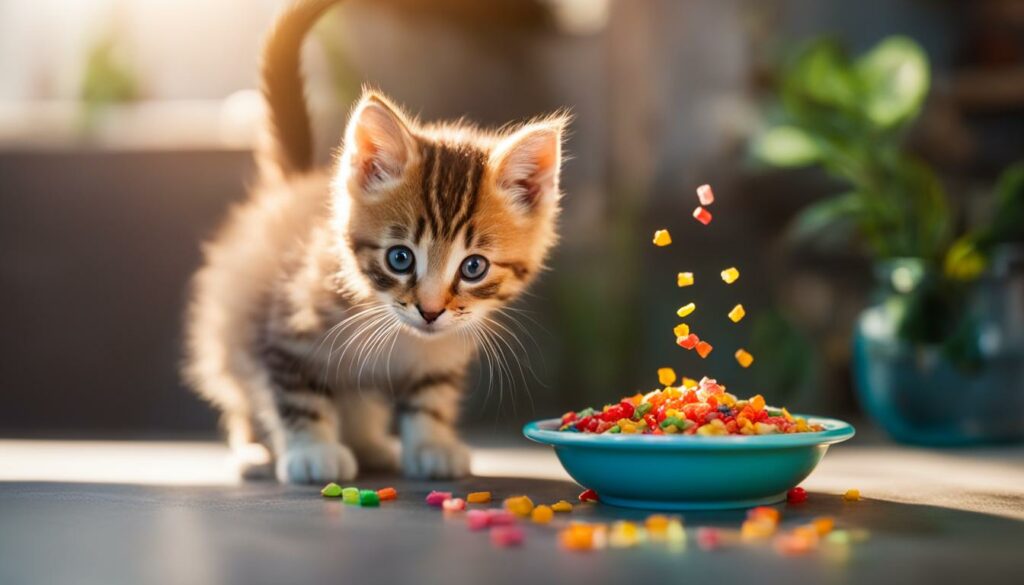
Join the Untamed Family
If you are looking for high-quality cat food that meets the nutritional needs of your kittens and cats, look no further than Untamed. As a proud member of the Untamed family, I can attest to the benefits of their tailor-made meals for feline friends of all ages and breeds.
When you join the Untamed family, you gain access to a wide range of benefits. Their meals are crafted with high-quality ingredients that are free of common allergens and artificial additives, ensuring that your furry friend receives the best nutrition possible. Plus, their packaging is 100% recyclable, making it an environmentally conscious choice.
Getting started with Untamed is easy. Simply visit their website, answer a few questions about your cat’s preferences and dietary needs, and select a meal plan that suits your requirements. You can even order a tailor-made taster box with no shipping fees to see if your cat approves of their delicious dishes.
Why Choose Untamed?
Choosing Untamed means choosing the best for your beloved cat. Their cat food is meticulously formulated with the ideal nutrient ratios to support proper growth and development in kittens. The high-protein diet ensures that your cat receives the essential amino acids they need for optimal health.
“Since switching to Untamed cat food, my cat’s coat has become shinier, and their energy levels have increased significantly. I can see that they are thriving on this nutritious diet.” – Happy Untamed Customer
With monthly deliveries of your cat’s favorite dishes, you never have to worry about running out of food. Untamed makes it convenient for you to provide the best care for your feline companion, ensuring they are well-nourished and satisfied.
| Benefits of Untamed Cat Food |
|---|
| Regulated bowel movements |
| Less mess in the litter box |
| Increased energy |
| Toned muscles |
| Fewer hairballs |
| Improved immune system |
| Better weight management |
Don’t compromise on your cat’s health and happiness. Join the Untamed family today and see the difference it makes in your cat’s life.
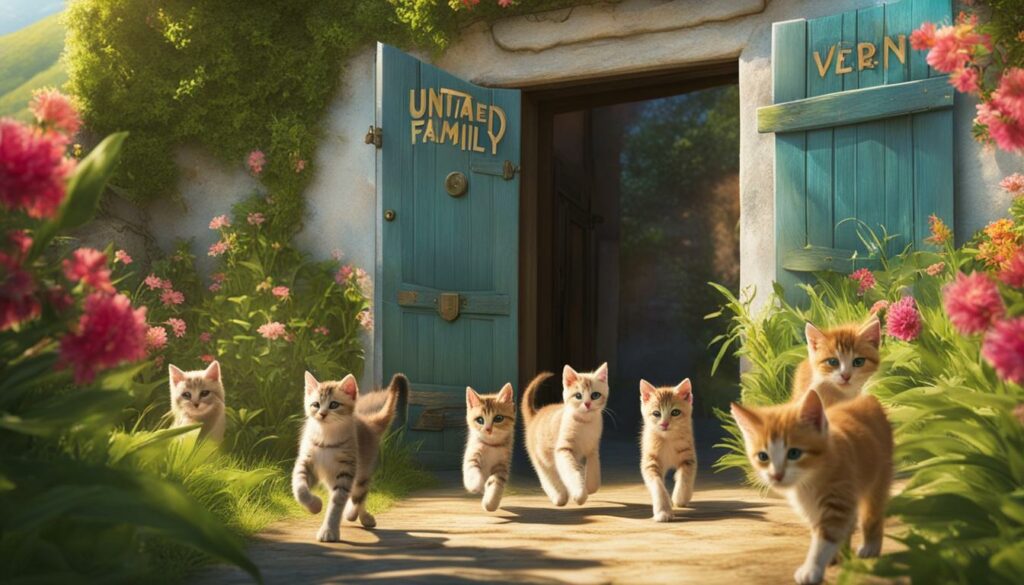
Customer Testimonials: The Benefits of Untamed Cat Food
As a proud member of the Untamed family, I can confidently say that switching my cat to Untamed cat food has been a game-changer. The benefits have been remarkable, and I couldn’t be happier with the positive impact it has had on my furry friend’s health and well-being.
“Since transitioning to Untamed cat food, my cat’s bowel movements have become more regular and predictable. No more messy litter boxes to deal with! It’s been a relief for both of us.”
Not only that, but I’ve noticed a significant increase in my cat’s energy levels. She’s more playful and active, which has led to toned muscles and a happier disposition. Plus, thanks to the carefully selected ingredients in Untamed cat food, she’s experiencing fewer hairballs and shedding less.
“I’ve also noticed that my cat’s immune system has improved since she started eating Untamed cat food. She’s less prone to illnesses and seems to bounce back quickly when she does get sick. It’s given me peace of mind knowing that her overall health is being supported.”
Untamed cat food is not only beneficial for my cat’s health, but it also aligns with my values. The ingredients used are ethically sourced from sustainable suppliers, and the packaging is 100% recyclable. It feels good to know that I’m making a positive impact on the environment while providing my cat with a nutritious and delicious meal.
The Results Speak for Themselves
But don’t just take my word for it. Many other cat parents have seen remarkable improvements in their cats’ health and well-being since making the switch to Untamed cat food:
- “My cat’s coat has never looked better! The high-quality ingredients in Untamed cat food have made her fur softer, shinier, and more lustrous.”
- “I used to struggle with finding a cat food that agreed with my sensitive cat’s stomach. Since switching to Untamed, she hasn’t had any digestive issues.”
- “I’ve noticed a significant improvement in my cat’s weight management. She’s maintaining a healthy weight without any extra effort on my part.”
If you’re looking for a cat food that not only meets your cat’s nutritional needs but also provides numerous benefits, I highly recommend joining the Untamed family. Your cat’s health and happiness are worth it.
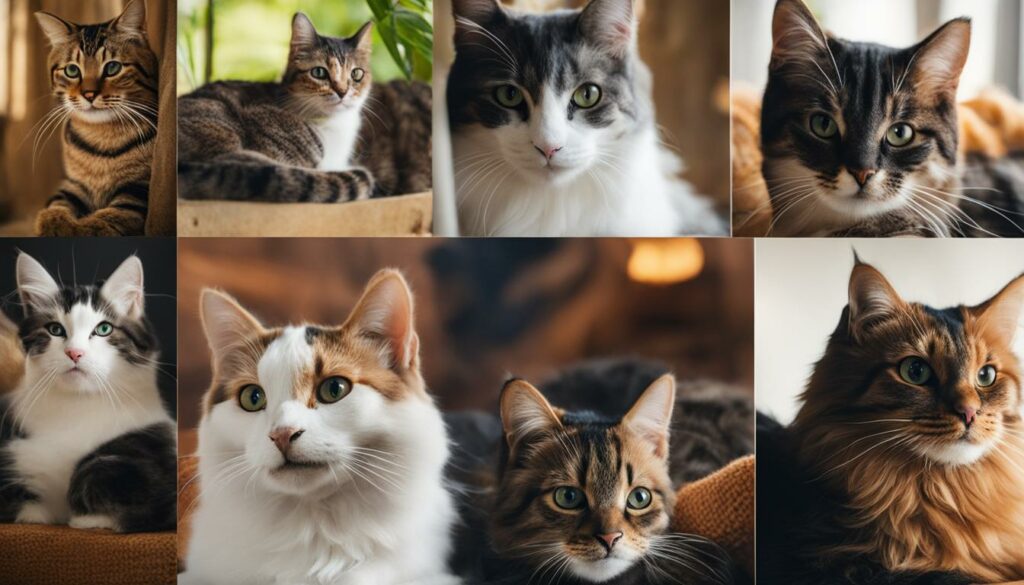
Can You Leave an Adult Cat Alone?
When it comes to leaving adult cats alone, it is important to consider their individual needs and adjust their routine accordingly. While adult cats can generally handle being alone for longer periods compared to kittens, it is essential to acclimate them gradually to being alone to avoid stress and anxiety.
One way to ensure a smooth transition is to start with short periods of alone time, around 30 minutes, and gradually increase the duration to three or four hours. This allows the cat to become comfortable with being alone and reduces the risk of them feeling overwhelmed or anxious. It’s also important to schedule their meal times accordingly and avoid leaving them alone during those times.
When leaving an adult cat alone, it’s crucial to consider their hydration and dietary needs. Wet food is a better option for cats as it provides additional hydration, but it should not be left out for too long as it can spoil. Dry food can be left in a bowl for a longer duration, but it may not provide sufficient hydration. Therefore, it’s recommended to have a cat sitter or someone who can provide food, water, and litter box maintenance for your adult cat when you are away for extended periods.

Adjusting adult cats to being alone requires patience and understanding. It’s important to ensure their well-being by providing them with a safe and stimulating environment. Regular playtime, interactive toys, and scratching posts can help keep them mentally and physically stimulated during their alone time. Additionally, installing audio and video equipment in your home can allow you to monitor and interact with your cat, providing them with a sense of companionship even when you’re not physically present.
| Leaving an Adult Cat Alone | Tips for Adjusting |
|---|---|
| Start with short periods of alone time (30 minutes) and gradually increase duration | Gradually introduce alone time to reduce stress and anxiety |
| Schedule meal times appropriately | Avoid leaving cats alone during meal times |
| Consider hydration and dietary needs | Provide wet food for additional hydration |
| Ensure a safe and stimulating environment | Offer interactive toys and scratching posts |
| Install audio and video equipment | Monitor and interact with the cat remotely |
References:
- Johnson, A. (2021). The Ultimate Guide to Leaving Adult Cats Alone. PetCare Magazine.
- Smith, J. (2020). Adjusting Adult Cats to Being Alone: Tips and Tricks. Cat Lovers Society.
Leaving Your Cat Alone When on Holiday
Going on holiday is an exciting time, but it’s important to make sure your beloved cat is well taken care of while you’re away. Leaving cats alone for long periods during holidays is not ideal for their well-being. Cats need regular access to fresh water, food, and companionship, so it’s essential to make arrangements for their care.
If you’re planning to be away for an extended period, it’s best to have someone check on your cat daily. This person can provide food, fresh water, and clean the litter box. They can also spend some time interacting with your cat to ensure they receive the companionship they need.
Alternatively, you may consider hiring a professional pet sitter or boarding your cat at a reputable cattery. A pet sitter can visit your home regularly to care for your cat, ensuring they maintain their routine and receive attention. Boarding your cat at a cattery allows them to be cared for in a safe and supervised environment, with trained professionals who understand their needs.
Remember to provide detailed instructions to the person taking care of your cat, including feeding schedules, any dietary restrictions, and contact information for your veterinarian. Providing your cat with a familiar blanket or toy can also help them feel more comfortable while you’re away.
FAQ
How long can you leave kittens alone?
The maximum time a kitten can be left alone depends on their age, ranging from less than 4 hours for kittens under 4 months to 24 to 48 hours for adult cats.
Is it a good idea to leave a kitten alone?
Whether or not it is a good idea to leave a kitten alone depends on their age. Kittens younger than 4 months should not be left alone for more than 4 hours, while kittens between 4 and 6 months can handle being alone for 4 to 8 hours.
How can I kitten-proof my home?
To create a safe environment for your kitten, make sure to shut all doors and windows, remove breakable items and sharp objects, hide electric cords, remove house plants and insect traps, place the litter tray in one corner and the food and water bowls in another, cover small holes, and keep harmful food items out of reach.
How can I keep my kitten entertained when I’m not home?
To keep your kitten entertained, you can use an automated feeder to give treats during the day, provide interactive toys, scratching posts, and a cat tree, leave food puzzles around the house, or introduce another pet for company.
What is the importance of proper cat care?
Proper cat care includes regular playtime, healthcare, grooming, and a balanced diet. Playtime keeps cats mentally and physically stimulated, healthcare ensures their overall well-being, grooming keeps them clean, and a balanced diet provides the necessary nutrients for their growth and development.
What are the nutritional needs of kittens?
Kittens require a high-protein diet, as they are obligate carnivores. Animal proteins, such as lean meat and fish, are essential for kittens as they contain vital amino acids. Cats cannot efficiently process proteins from plant sources.
How can I join the Untamed family?
Joining the Untamed family is easy – visit their website, answer a few questions about your cat, select a meal plan, and order a trial pack. You will receive a tailor-made taster box with no shipping fees.
What benefits have customers reported after switching to Untamed cat food?
Customers who have switched their cats to Untamed cat food have reported regulated bowel movements, less mess in the litter box, increased energy, toned muscles, fewer hairballs, less shedding, improved immune systems, and better weight management.
Can you leave an adult cat alone?
Adult cats can be left alone for longer periods compared to kittens, but they can still become stressed if they are not used to being alone. It is important to gradually acclimate adult cats to being alone by starting with short periods and gradually increasing the time.
What should I do if I need to leave my cat alone during a holiday?
It is not recommended to leave your cat alone for long periods when you go on holiday. It’s important to make arrangements for someone to check on the cat, provide food, water, and clean the litter box while you are away.
Source Links
- https://www.untamedcatfood.com/blogs/cat-care/how-long-can-you-leave-a-kitten-alone
- https://iandloveandyou.com/blogs/pet-blog/owners-guide-to-leaving-your-cat-home-alone
- https://www.purina.co.uk/articles/cats/behaviour/travel/leave-cat-at-home

